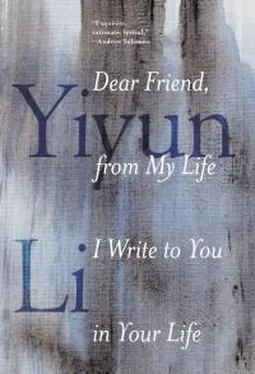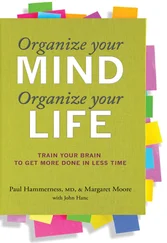It turned out that I could not travel to Bath. There was publicity lined up for the day. I was disappointed but relieved. External interference pardons one from ambivalence. My wish to meet Trevor was as strong as the fear that it might happen—there was no way to rid the doubt that had begun to plague me: Who are you? What makes you think of yourself as innocuous?
I phoned back, with the hope that Trevor would be relieved, too. We chatted about the weather—rain in London and rain in Devon—for a minute. He told me there would be other opportunities. Next year he and his wife were planning to visit America. By ship, he said; I can guarantee you it’s a more pleasant way to travel.
—
JULY 2015. WE visited China for the first time since my husband and I became American citizens. While in Baishan, my husband’s hometown, my mother called and said her brother had died that morning.
Years ago, I had written a novel set in Baishan without having seen it. Baishan, White Mountain, used to be Muddy River, named after the river running through town. In the 1990s the city government had deemed the name a hindrance to its prosperity and rechristened the city. With a novelist’s opportunism I had claimed the unwanted Muddy River. My husband had drawn a map of the city circa the 1970s, and I had followed people’s footsteps in it.
When we entered the city I noticed the bridge where two of my characters met for the first time, the foot of the mountain where a trusting dog was poisoned, the cooling tower of the electricity plant where a murderous janitor worked, and the river itself, befittingly muddy, fast flowing after days of rain. I had wondered if I would notice things about the place and its people that I had not imagined while working on the novel. I did not, which was a disappointment. I do not mind that my imagination is limited; I do mind when the world is not bigger than what one can imagine.
Until the phone call about my uncle’s death, I had been dispirited. Please, I ordered my eyes, find one thing that is not anticipated, but everything in China seemed only to confirm. The cabdrivers told political jokes that I had heard twenty years earlier. The pushing crowd made me impatient, and I elbowed queue cutters with an aggressiveness that came back as easily as the rude slang I hurled at them. My children, Western tourists, were continually amused by the inept English translations of public announcements and signs, but to me they were stale jokes. Only once did I stop to appreciate a message. At the Beijing international airport, a woman on a bulletin board encourages her audience to enjoy life. “Take a look at this wonderful life unfolding in front of you,” she exhorts in Chinese, but sounds skeptical (or subversive) in the English translation: This wonderful life lies as you see it.
—
THE FIRST STORY I ever read by William Trevor was “Traditions,” set in an Irish boarding school. It was published in The New Yorker with a photo of young scholars in dark suits as illustration. Its reality was far from mine. I was in a science program then, uncertain if I should continue. My doubt was that I could easily see my life unfurl in front of me: a degree in a year, a few years of post-doctorate training, a secure job in academia or the biomedical industry, a house and children, a dog because a dog rollicking in a neatly maintained yard had always appeared to me to be the pinnacle of an American life.
I checked out The Hill Bachelors, Trevor’s newest collection, after reading the story, and trudged through the snow from the university library to the student union, where I sat on a green sofa next to a movie theater where films in foreign languages drew a limited crowd every night. Details preserved by memory can be dull, significant only to the one remembering, but it is the mundane that remains mysterious.
It would be presumptuous to claim that a connection was made during that first encounter; it would not be as presumptuous to say a space that had not been known to me was made possible through reading Trevor. From The Hill Bachelors I moved on to his other books. A few weeks later I discussed with my advisor the possibility of leaving science. Stay, he said; you have a bright future in this country. Yes, I said, but I can already see myself at the end of that future; I know I will regret it if I don’t try this.
This, as I explained to him, was to become a writer. To write is to find a new way to see the world, and I did not doubt, as I was reading Trevor, that I wanted to see as he does.
—
LETTERS WERE EXCHANGED a few months ahead of Trevor’s visit to America to set the date of the meeting. In October 2007, I took a red-eye flight from California to Boston to meet him for lunch. I had three hours, as I was to catch the evening flight back.
Many things were talked about during the lunch: a trip the previous year Trevor and his wife, Jane, had taken to meet the letterer who would carve their gravestones; a conversation decades ago with his father about becoming a letterer himself; a funeral during which religious music had been played against the will of the dead and the alive; a conversation with Graham Greene, another with V. S. Pritchett; descriptions of Molly Keane’s work and the graveyard she was buried in, which I would visit the next year. Halfway through the lunch, a woman in an orange blouse walking past the restaurant patio caught Trevor’s attention. There was something incomprehensible about her in that moment, he explained. Such moments may pass, he said, though I sensed that often they did not.
After lunch Trevor showed me the work of Henry Moore near his hotel. I followed him, or my eyes followed where I thought he was looking, feeling apprehensive. I could describe the sunny New England afternoon in October and the bronze sculptures surrounded by the trees that were changing colors, but they would be clichés. The truth is, I did not know what I was supposed to see.
—
THIS APPREHENSION REPEATS itself, in museums and galleries and movie theaters. Once a friend pointed out that a sentence I had written describing a chrysanthemum felt wrong. It’s not bad, I said, defending it, not doubting at all that I had made every word right. It was not that the sentence was poorly written, she said, but that it was written not from perception but its absence.
This art of seeing—a painting, a sculpture, a film—is an elusive one to me. In Trevor’s novella Nights at the Alexandra, a cinema in a provincial Irish town offers the setting of a tale of love and loyalty. In Trevor’s memoir, days are whiled away in cinemas, the boredom of youth compensated by the wonders on screen.
I have never felt the attraction to films. The movie theaters in Beijing—Workers’ Clubs they were called in the 1970s and early 1980s, which held over a thousand people—offered little wonder. The newsreels about King Sihanouk and his comrade General Pol Pot were repetitive, and the movies, which we were often required to see as part of school, did not interest me as much as the people sitting nearby, a woman cracking sunflower seeds or a man gurgling while drinking tea from a mug. Often someone would be summoned during a movie. A handwritten note, saying Comrade So-and-So was requested due to an emergency, would be projected onto the dark column next to the screen. These interruptions felt like riddles to which the answers were withheld forever. Obligingly I offered scenarios to satisfy myself. I wished that my name would appear.
One of my most dreaded activities in the army was the weekly movie, an enrichment activity to raise morale. I established a competition with the girl who sat next to me to see who could sleep through these movies longer—I was the more frequent winner. But my feats were not as admirable as those of the girl in another squad, who could stand in the most perfect military posture but doze off confidently.
Читать дальше












